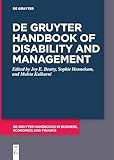De Gruyter Handbook of Disability and Management / ed. by Joy Beatty, Sophie Hennekam, Mukta Kulkarni.
Material type: TextSeries: De Gruyter Handbooks in Business, Economics and FinancePublisher: Berlin ; Boston : De Gruyter, [2023]Copyright date: ©2023Description: 1 online resource (XXII, 419 p.)Content type:
TextSeries: De Gruyter Handbooks in Business, Economics and FinancePublisher: Berlin ; Boston : De Gruyter, [2023]Copyright date: ©2023Description: 1 online resource (XXII, 419 p.)Content type: - 9783110743524
- 9783110743739
- 9783110743647
- online - DeGruyter
- Issued also in print.
| Item type | Current library | Call number | URL | Status | Notes | Barcode | |
|---|---|---|---|---|---|---|---|
 eBook
eBook
|
Biblioteca "Angelicum" Pont. Univ. S.Tommaso d'Aquino Nuvola online | online - DeGruyter (Browse shelf(Opens below)) | Online access | Not for loan (Accesso limitato) | Accesso per gli utenti autorizzati / Access for authorized users | (dgr)9783110743647 |
Frontmatter -- Contents -- List of Contributors -- Introduction: Workplace Inclusion of Persons with Disabilities – Contemporary Assumptions, Definitions, and Concepts to Guide Research and Practice -- Part 1: Framing the Discussion -- 1 Overview of Disability Paradigms in Disability and Management Research -- 2 The Future of Disability Research in the Workplace -- 3 The Current and Future Law of Accommodation -- 4 Organisational Disability Measurement and Reporting in the UK -- Part 2: Intersectionality -- 5 COVID-19 and Employment Losses for Workers with Disabilities: An Intersectional Approach -- 6 Age, Mental Disorders and Work Design Factors -- 7 Workplace Accommodations for Employees with Concealable Identities: An Overview of Theoretical Paradigms and Review of Empirical Research -- Part 3: Social Reactions to Disability -- 8 Understanding the Complexity of Disability Stigma and its Consequences for Workers and Organizations -- 9 Managers’ Reactions to Job Applicants and Employees with Disabilities -- 10 The Influence of a “Best Employer Award” on Hiring Managers’ Beliefs and Intentions to Hire People with Disabilities -- 11 Leaders with Disabilities: A Boardroom Challenge -- Part 4: The Role of Context -- 12 A Disability Contingency Framework for the Workplace -- 13 Temporal Challenges at the Intersection of Mental Illness and Work -- 14 Organizational Culture’s Influence on Employing People with Disabilities -- 15 Tensions in the Management of Disabled Individuals: The Case of the Sheltered Sector in France -- Part 5: Expanding Disability Definitions -- 16 Reframing Management of Organisational Neurodiversity in Australia: A Contextual Approach -- 17 Neuroqueerness and Management Research -- 18 Burnout From an Extended Social Model Perspective: Lived Experiences of Burnout, Lasting Burnout Effects and Returning to Work -- 19 Sanism: An Inquiry into and Critique of the Workplace Exclusion of People with Serious Mental Illness -- Part 6: Research and Practice -- 20 Disability-Inclusive Online Outreach and Recruitment for Employers -- 21 To Tell or Not to Tell? Co-Developing an Interactive Online Tool That Supports Employees with Invisible Disabilities to Make a High-Quality Disclosure Decision -- 22 Challenging Disability Inequality Embedded Within the Online Recruitment Process -- 23 Fostering Disability Inclusion through Evidence-Based Research-Practice Collaborations – Challenges and Key Success Factors -- List of Figures -- List of Tables -- About the Editors -- Index
restricted access online access with authorization star
http://purl.org/coar/access_right/c_16ec
Globally, the prevalence of disability is growing, as is disability awareness. The disability rights movement argues that the right to employment is essential for full participation and human dignity. While there have been improvements related to broad diversity programs and policies, those for persons with disabilities, especially less visible or invisible disabilities, have received less attention. Contextual factors such as the legal environment and protections, cultural and social values, religious norms, and broader economic conditions shape the employment prospects for persons with disabilities. The De Gruyter Handbook of Disability and Management uses an interdisciplinary lens to study disability and management, integrating perspectives from disability studies, psychology, education, and legal domains. It aims to incorporate a contextually sensitive and global perspective to emphasize actionable areas of inclusion and provides a more international focus by including contributions from across the world including contries and regions that have till date received less attention in the area of disability studies. Managers, human resource professionals, and policy makers can be more proactive to support persons with disabilities, and more insights, best practices, and tools are needed to facilitate this support. This handbook will guide and support efforts of organizational stakeholders and policy makers as they strive to be more inclusive.
Issued also in print.
Mode of access: Internet via World Wide Web.
In English.
Description based on online resource; title from PDF title page (publisher's Web site, viewed 06. Mrz 2024)


